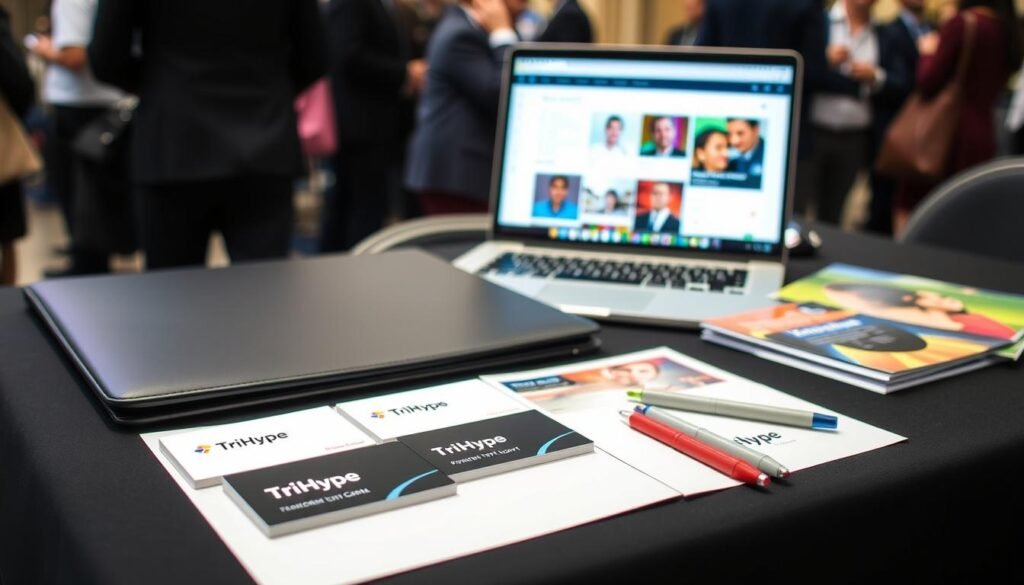In today’s job market, prepare for networking is key to finding great career opportunities. Studies show that up to 80% of jobs are found through personal connections. So, learning how to network well at events is crucial for career growth.
This guide will teach you how to get ready for networking events. You’ll learn about setting goals, researching, making a strong elevator pitch, and more. By the end, you’ll know how to make valuable connections and advance your career.
Key Takeaways
- Networking is a crucial skill for career advancement, with up to 80% of job openings filled through personal connections.
- Effective preparation is key to maximizing the success of networking events.
- This guide covers essential strategies for defining your goals, researching the event and attendees, crafting a strong elevator pitch, and more.
- Mastering networking etiquette and professional communication can help you make a positive first impression and build lasting relationships.
- Continuous learning and improvement are vital for continuously enhancing your networking skills.
Defining Your Networking Goals
Before you go to a networking event, it’s key to know what you want to get out of it. What are your networking goals? Maybe you’re looking for a new job, more clients, or just to meet people in your field. Knowing your networking objectives helps you stay on track and use your time wisely.
Identifying Your Objectives
Think about why you’re going to the event. Ask yourself:
- Do you want to explore new career opportunities?
- Are you looking to generate leads for your business?
- Do you aim to build relationships with industry influencers and thought leaders?
- Are you hoping to learn about the latest trends and developments in your field?
Setting Realistic Expectations
It’s also important to have realistic expectations for the event. Networking takes time and effort. Don’t expect to find a job or get a big client in one day. Instead, focus on making real connections and laying the groundwork for future chances.
“Networking is not about just connecting. It’s about connecting with purpose.” – Lewis Howes
By setting clear networking goals, objectives, and expectations, you’ll be ready to make the most of the event. This approach will help you stay focused, productive, and successful in your networking efforts.
Researching the Event and Attendees
Getting ready is key to networking success. Before a networking event, it’s important to research the event and who will be there. This helps us make the most of the networking chances.
First, let’s look at the networking event. We need to know its purpose, the industry it’s in, and what networking chances it offers. This helps us plan our approach and find the right people to connect with.
Then, we’ll research the event attendees. We should find out who the key people are, like influencers or decision-makers. Knowing their background, interests, and challenges helps us have better conversations and leave a strong impression.
To find this information, we can use the event’s website, social media, and attendee lists. We can also do online research on the people we want to meet. This gives us valuable insights.
By spending time on researching the event and attendees, we’re ready to make the most of the event. We’ll have a better chance of building strong connections.
How to Prepare for Networking
Effective networking preparation strategies are key for any event. Before you go, review your work history, skills, and experiences. This helps you share your unique value clearly.
Creating a strong elevator pitch is crucial. It should show your strengths, interests, and what you can offer. Practice your pitch so you can impress people right away.
Also, make sure your business cards and digital portfolio are current. They should show who you are and what you know. This helps you share important info with others.
“Preparation is the key to successful networking. Take the time to get your pitch and materials ready, and you’ll be on your way to making meaningful connections.”
By preparing for networking ahead of time, you’ll feel more confident. You’ll focus on making real connections with others. Remember, it’s better to have a few good connections than many weak ones.
Crafting Your Elevator Pitch
At networking events, your elevator pitch is key to making a lasting impression. It should quickly tell people who you are, what you do, and what you can offer. Learning to craft a strong elevator pitch is vital for networking and meeting new people.
Essential Elements of an Elevator Pitch
Your elevator pitch should cover a few important points:
- Your background and expertise
- A clear explanation of your current role or business
- Your unique value proposition and what sets you apart
- A strong call-to-action or invitation to continue the conversation
Practicing Your Delivery
How you deliver your elevator pitch is just as crucial as what you say. Practice until it feels natural. Keep eye contact, speak clearly, and sound positive and engaging. Adjust your pitch for each person you meet, based on their interests.
With a well-crafted elevator pitch and confident delivery, you can make lasting connections. This can lead to new opportunities at networking events.

Curating Your Professional Appearance
At a networking event, how you look matters a lot. A neat and polished outfit shows you’re ready and serious. It boosts your confidence and shows you care about the event. Here are key tips for picking the right networking attire.
Selecting Appropriate Attire
Start by finding out what to wear by checking the event’s dress code. This helps you pick the right professional attire. It’s usually safer to choose something a bit more formal, like a suit or a nice business casual outfit.
- Go for fabrics and colors that look smart and professional.
- Make sure your clothes are smooth, fit well, and look good.
- Don’t forget about grooming like a neat haircut, clean nails, and simple accessories.
By dressing professionally, you show you’re confident and reliable. A good professional appearance helps you make a strong first impression. It also helps you connect better with others at the event.
Preparing Networking Materials
Having the right materials at a networking event can make a big difference. Your materials show who you are and what you offer. Make sure they look good, are professional, and show your unique skills.
Business Cards and Digital Portfolios
Business cards are still key for networking. They should look good, be current, and show your brand. Include your name, job, contact info, and a short statement about your skills. Also, think about having a digital portfolio or website. It can be a great way to start conversations and make a strong impression.
Here are some tips for your networking materials:
- Make sure your business cards are clean and free of mistakes.
- Customize your business cards for the event or industry you’re in.
- Make your digital portfolio or website showcase your best work and achievements.
- Use keywords like networking materials, business cards, and digital portfolios to help people find you online.
By focusing on your networking materials, you can make a great first impression. This can help you make important connections at the event.

Building Your Confidence
Networking can feel scary, especially for introverts or those who get nervous in crowds. But, confidence is crucial for networking success. By doing things that make you feel good about yourself and staying positive, you can beat networking anxiety and handle events with ease.
Practicing your elevator pitch is a great way to boost networking confidence. Make sure your pitch is short and shows off your best skills and experiences. Rehearsing will make you feel more comfortable and confident, impressing others.
Visualization is also a strong tool against networking anxiety. Picture yourself doing well at the event, having great conversations, and making important connections. Seeing yourself succeed can make you feel more confident and calm before the event.
Don’t forget to think about your achievements and strengths. Remember your talents and experiences that make you valuable. Feeling good about yourself will help you be more confident and genuine at networking events.
“Confidence is a habit that can be developed by acting as if you already have it.”
– Sylvia Plath
Networking is a skill that gets better with practice and a positive attitude. By doing things that build your confidence, imagining success, and celebrating your strengths, you can handle networking events with ease and make lasting connections.
Networking Etiquette and Professionalism
Being professional and following networking etiquette is key to making a good impression. It helps you build strong connections at networking events. By following simple rules, you can show yourself in the best light and have meaningful talks with others.
Making a Positive First Impression
The first few moments are crucial. When you meet someone new, shake hands firmly, look them in the eye, and smile. This shows you’re confident and friendly, making a good impression right away.
Active Listening and Engagement
Listen well and show you care about what the other person is saying. Don’t talk too much yourself. Instead, ask questions that show you’re interested. Pay attention to how you look and sound, so you seem open and focused.
By following networking etiquette and staying professional, you’ll make great connections. You’ll also engage in conversations that could lead to new chances.
| Networking Etiquette Tip | Description |
|---|---|
| Greet with Confidence | Offer a firm handshake, make eye contact, and greet with a friendly smile. |
| Practice Active Listening | Ask thoughtful questions and show genuine interest in the other person’s experiences. |
| Mind Your Body Language | Maintain an open, approachable posture and be mindful of your tone of voice. |

“Networking is not about just connecting people. It’s about connecting people with people, people with ideas, and people with opportunities.”
Initiating Meaningful Conversations
Networking events can feel overwhelming, especially when starting conversations with new people. But, with the right preparation, you can make these interactions valuable. It’s all about breaking the ice and starting interesting discussions.
Icebreakers and Conversation Starters
Before you go to a networking event, prepare some icebreakers and conversation starters. Open-ended questions are great for starting a conversation. Try asking, “What brought you to this event today?” or “What are you hoping to achieve through your networking efforts?”
Also, be ready to talk about yourself. Create a short elevator pitch that shows your professional background and interests. Use it to start a conversation. Remember, the goal is to make real connections, not just collect cards.
- Prepare a few icebreakers and conversation starters in advance
- Ask open-ended questions to encourage the other person to share
- Be willing to share information about yourself and your professional journey
- Focus on building genuine connections, not just collecting business cards
By going to networking events with a positive attitude and a desire for meaningful conversations, you can make a lasting impression. You’ll also grow your professional network in a real and effective way.
Expanding Your Network
Going to networking events is a great chance to meet important people in your field. You can find influencers, decision-makers, and thought leaders who match your career goals. This way, you can grow your professional network.
It’s important to be humble, show real interest, and be ready to help when talking to these people. Using your connections with industry leaders can lead to new chances and help you reach your career dreams.
Connecting with Influencers and Thought Leaders
Meeting influential figures and thought leaders in your field can really help you grow. They know a lot, share valuable insights, and can open doors for you. By reaching out and talking to them, you can find special opportunities, learn more, and maybe even make partnerships.
When you talk to influential people, be open-minded, show you care about their work, and be ready to help. This could mean sharing news, helping with a project, or just listening well. The goal is to make a real connection, not just to sell or ask for favors.
| Strategies for Connecting with Influencers | Strategies for Connecting with Thought Leaders |
|---|---|
|
|
By expanding your professional network and connecting with influencers and thought leaders, you can get valuable insights, find new chances, and speed up your career growth.

Following Up After the Event
The networking journey doesn’t stop after the event. It’s key to follow up with new contacts quickly and meaningfully. This way, you can open up many opportunities and grow a strong network that supports your career.
Nurturing Professional Relationships
Right after the event, make sure to reach out to the people you met. Say thank you for their time and the insights they shared. Then, think of ways to add value and keep the conversation alive.
- Share relevant industry news, articles, or resources that could be of interest to your new contacts.
- Offer to introduce them to other professionals who could help with their career or business goals.
- Suggest a follow-up meeting, whether it’s a virtual coffee chat or an in-person meeting, to explore more opportunities for collaboration or mentorship.
It’s important to keep these relationships growing. Show you care about their professional growth and want to help. This way, you’ll make your connections stronger and more likely to last.
“Networking is not about just connecting people. It’s about connecting people with people, people with ideas, and people with opportunities.”
– Michele Jennae
Don’t forget, follow-up after networking and nurturing professional relationships are key. Keep in touch, offer help, and care for these connections. They can open new doors and help your career grow.
Leveraging Social Media for Networking
In today’s digital world, social media is key for growing and keeping professional networks alive. By being active on sites like LinkedIn, you can meet new people, talk with industry friends, and learn about new trends and chances.
To make the most of social media for networking, try these tips:
- Join online talks and forums to show off your skills and build friendships.
- Post useful, interesting stuff that your audience will like and see you as a leader.
- Use LinkedIn’s advanced search to find and connect with big names, possible partners, and leaders in your field.
- Make your connection requests and messages personal to leave a real impression and build strong bonds.
- Go to online events and webinars to meet more people and talk with those who share your interests.
By being active and using these strategies, you can get more noticed, find new chances for growth, and make lasting connections that can help your career.
“Leveraging social media for networking is not just an option – it’s a necessity in today’s business landscape.”

Remember, good social media for networking takes work and a smart plan. Spend time making your online profile great, talking with your network, and growing your relationships to get the most out of this powerful tool.
Overcoming Networking Anxiety
Networking can feel scary, especially for introverts or those with social anxiety. But, with the right approach, you can do well. Focus on making real connections, not just collecting cards.
Strategies for Introverts
Begin with one-on-one talks. This makes you feel more at ease. Then, move to bigger groups, using your listening and questioning skills to impress.
Networking isn’t just about you. It’s a chance to learn from others. See it as a way to grow, not just a task.
Don’t stress too much. It’s okay to feel a bit nervous. Even pros have had to face their fears. With time and a positive attitude, you’ll get better at networking.
“The most important thing to remember is that networking is not about collecting business cards or making a sale. It’s about building relationships and finding ways to help others.”
Use overcoming networking anxiety tips for introverts. This way, networking can become a chance to grow your network and yourself.
Continuous Learning and Improvement
Effective networking is a journey that never ends. We must always be ready to learn and grow. By doing so, we can stay ahead in our careers and make meaningful connections.
Reflecting on our networking experiences is crucial. We should think about what worked and what didn’t. This helps us find ways to get better and improve our skills.
Learning continuously helps us meet new challenges. As jobs and industries change, we need to adapt. This way, we stay relevant and valuable to others.
Embracing a culture of continuous learning is key to success. By focusing on our networking skills, we open doors to new opportunities. We become dynamic and forward-thinking in our fields.

“Continuous learning is the minimum requirement for success in any field.” – Brian Tracy
| Skill | Description | Improvement Strategies |
|---|---|---|
| Active Listening | The ability to fully engage with and understand what others are saying during networking conversations. |
|
| Adaptability | The flexibility to adjust one’s networking approach based on different situations and individuals. |
|
| Confidence | The self-assurance to engage in networking activities and make a positive impression. |
|
New cross-industry network for sustainability
Conclusion
Getting ready for networking events can really change our career paths. We need to set goals, learn about the event and who will be there. Then, we should work on our elevator pitch and learn how to network well.
Being confident and talking to people in a meaningful way is key. We also need to keep in touch with our new contacts after the event.
With the right approach, networking can help us grow both personally and professionally. By focusing on networking event preparation, networking success, and professional networking, we can find new chances and grow faster in our careers.
Let’s dive into networking with excitement and hope. Using the tips from this article, we can move through the networking world with confidence. We’ll make connections that will help our careers move forward.
